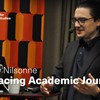standards
Political Double Standards in Reliance on Moral Foundations
Judgment abd Decision Making Abstract Prior research using the Moral Foundations Questionnaire (MFQ) has established that political ideology is associated with self-reported reliance on specific moral f
Authority and Coercion Beyond the State? The Limited Applicability of Legitimacy Standards for Extraterritorial Border Controls
Jus Cogens, vol. 6, p.141–160 Abstract Extraterritorial border controls prevent migrants from arriving at the territory of the state and effectively undermine rights to apply for asylum and protections
Grounding the legitimacy of international institutions in personal and collective autonomy? Human rights, state consent and alternative standards
Place: The Institute for Futures Studies, Holländargatan 13, StockholmInternational institutions make claims to authority that can clash with both personal and collective autonomy. At the same time, th
Uncivil speech in the social media: Democracy, Political liberalism, and the virtue of Public Reason
Constellations Introduction Initial hopes of the democratizing potential of the internet are increasingly replaced by fear that a fragmented and unedited public sphere unleashes the destructive forces o
Adapting To Globalised Product And Labour Markets: New Models For Apprenticeship in Europe
The paper identifies two distinct models of apprenticeship in Europe: the well-established demand-driven model found and the more recently revived supply-driven model. The paper concludes that countri
Ethnicity in England: What Parents' Country of Birth Can and Can't Tell Us about Their Children's Ethnic Identification.
Journal of Ethnic and Migration Studies, 41(3), 399-424. DOI:10.1080/1369183X.2014.920690 Abstract Despite the importance of adequately measuring ethnicity to keep track of ethnic disparities in importa

Gustav Nilsonne: Pathways to an Open Science System. Replacing Academic Journals
Open science enables cumulative knowledge and facilitates discovery. The transition to an open science system is underway, but important roadblocks remain. A decentralised, evolvable network of platfo
Articles, videos and interviews on the corona pandemic
Our researchers comments the corona pandemic from their field of expertise. All the articles, videos and interviews are collected here. Is Sweden's soft lockdown working?Despite relatively high number
The Demos and Its Critics
The Review of Politics, 81(3), 435-457. doi:10.1017/S0034670519000214 Abstract The “demos paradox” is the idea that the composition of a demos could never secure democratic legitimacy because the composi
Gustav Nilsonne: Pathways to an open science system: Replacing academic journals
Venue: Institutet för framtidsstudier, Holländargatan 13, 4th floor, Stockholm, and onlineREGISTERResearch seminar with Gustav Nilsonne, Associate Professor of neuroscience. He is active in meta-sciencOpen science enables cumulative knowledge and facilitates discovery. The transition to an open science system is underway, but important roadblocks remain. A decentralised, evolvable network of platforms interconnected by open standards, and governed by the scientific community, is technically feasible. However, academic researchers remain tied to traditional journals not least because assessment of merit is tied to the venue of publication. Ways forward can include redirection of funding from legacy publishing models to new infrastructure and the development of new methods to assess scientific contributions. Concerted action by stakeholders needs to be combined with pluralistic experimentation on policies and interventions to further open science practices.








